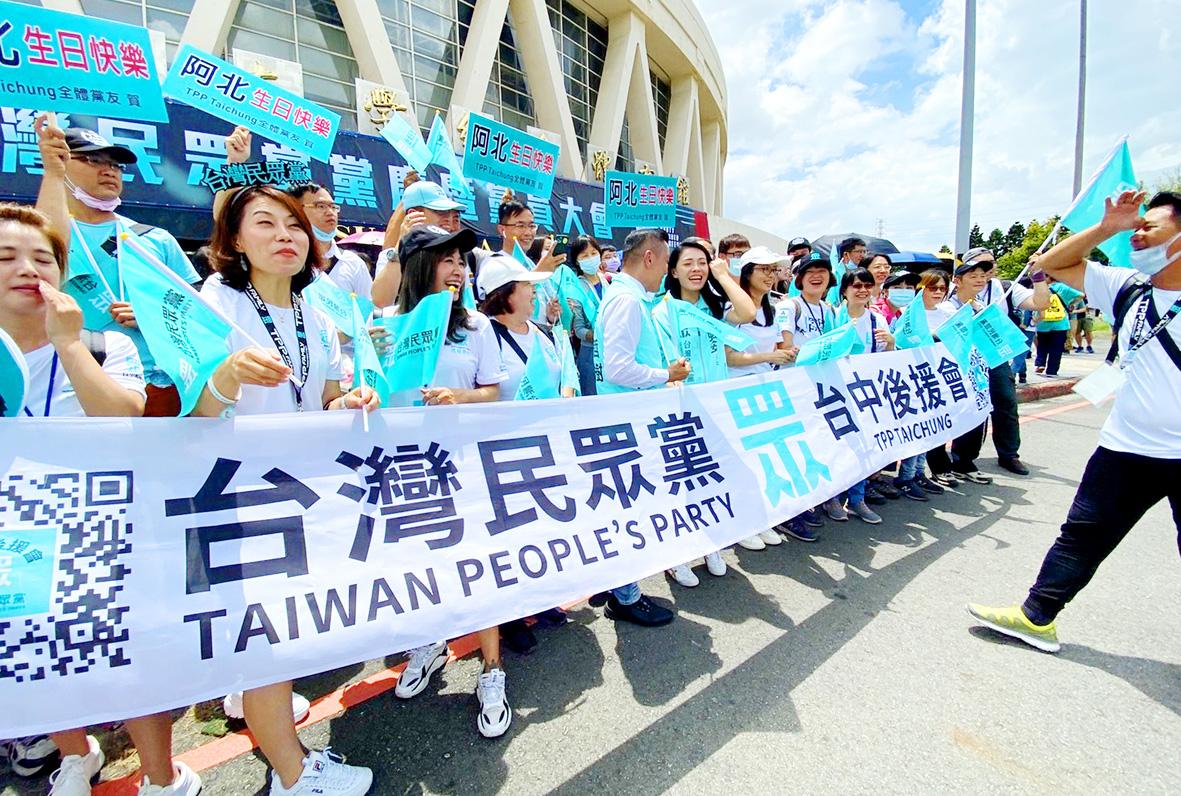The time has arrived for Taiwan to have a second “silent revolution,” Taiwan People’s Party (TPP) Chairman Ko Wen-je (柯文哲) told the party’s conference yesterday afternoon at the National Taiwan Sport University in Taoyuan.
The first “silent revolution” was the democratization process in the early 1990s initiated by then-president Lee Teng-hui (李登輝).
The conference in the school’s gymnasium was attended by 5,141 TPP members.

Photo: CNA
In his opening remarks, Ko talked about political reform under Lee and the need for reform today.
“Lee’s greatest contribution was setting Taiwan on an irreversible path to democratization, without which we would not be meeting today to discuss Taiwan’s future,” Ko said.
“Direct presidential elections were held and a Taiwanese consciousness was established, but today political power goes unchecked and the major parties vie for power,” he said. A “second silent revolution is needed for social inclusion [in politics] and the realization of national governance.”
The TPP could hopefully be a “model” party in the legislature, engaging with legislators from other parties rather than confronting them, he said.
Social inclusion could be achieved through communication with the public, Ko said, citing the Taipei-Shanghai twin-city summit, which he said was of benefit to Taiwanese businesspeople and students in China, despite being “smeared as a pro-China” activity.
The central government must “create flexible international space” and must not let ideology prevent it from communicating with China, he said.
The TPP would continue to act as a check on budget spending, promote constitutional reform and fight for issues such as housing justice and amendments to the Mining Act (礦業法), he said.
The party needed to elect a public liaison official, and would hold smaller member meetings in every county and municipality, he added.

The Ministry of Education (MOE) is to launch a new program to encourage international students to stay in Taiwan and explore job opportunities here after graduation, Deputy Minister of Education Yeh Ping-cheng (葉丙成) said on Friday. The government would provide full scholarships for international students to further their studies for two years in Taiwan, so those who want to pursue a master’s degree can consider applying for the program, he said. The fields included are science, technology, engineering, mathematics, semiconductors and finance, Yeh added. The program, called “Intense 2+2,” would also assist international students who completed the two years of further studies in

The brilliant blue waters, thick foliage and bucolic atmosphere on this seemingly idyllic archipelago deep in the Pacific Ocean belie the key role it now plays in a titanic geopolitical struggle. Palau is again on the front line as China, and the US and its allies prepare their forces in an intensifying contest for control over the Asia-Pacific region. The democratic nation of just 17,000 people hosts US-controlled airstrips and soon-to-be-completed radar installations that the US military describes as “critical” to monitoring vast swathes of water and airspace. It is also a key piece of the second island chain, a string of

Former president Tsai Ing-wen (蔡英文) departed for Europe on Friday night, with planned stops in Lithuania and Denmark. Tsai arrived at Taiwan Taoyuan International Airport on Friday night, but did not speak to reporters before departing. Tsai wrote on social media later that the purpose of the trip was to reaffirm the commitment of Taiwanese to working with democratic allies to promote regional security and stability, upholding freedom and democracy, and defending their homeland. She also expressed hope that through joint efforts, Taiwan and Europe would continue to be partners building up economic resilience on the global stage. The former president was to first

Taiwan will now have four additional national holidays after the Legislative Yuan passed an amendment today, which also made Labor Day a national holiday for all sectors. The Chinese Nationalist Party (KMT) and Taiwan People’s Party (TPP) used their majority in the Legislative Yuan to pass the amendment to the Act on Implementing Memorial Days and State Holidays (紀念日及節日實施辦法), which the parties jointly proposed, in its third and final reading today. The legislature passed the bill to amend the act, which is currently enforced administratively, raising it to the legal level. The new legislation recognizes Confucius’ birthday on Sept. 28, the